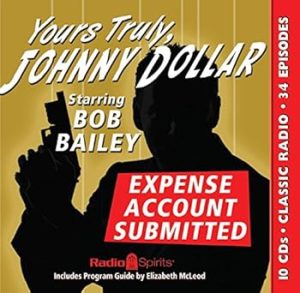
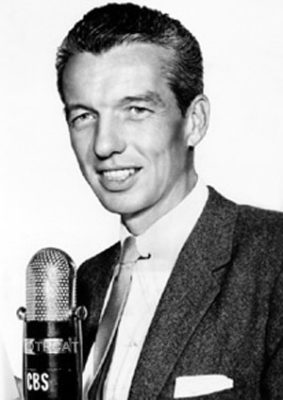 Yours Truly, Johnny Dollar (1949-1962) aired “The Poor Little Rich Girl Matter” on September 1, 1957. We’ve showcased but seven earlier episodes of this highly regarded show, the first back in 2019 and the last in January of 2025. Guest host Pete Wood wrote the introduction to the May 2020 episode, from which I have taken the liberty of selectively editing for current purposes and for those not familiar with the show.
Yours Truly, Johnny Dollar (1949-1962) aired “The Poor Little Rich Girl Matter” on September 1, 1957. We’ve showcased but seven earlier episodes of this highly regarded show, the first back in 2019 and the last in January of 2025. Guest host Pete Wood wrote the introduction to the May 2020 episode, from which I have taken the liberty of selectively editing for current purposes and for those not familiar with the show.
Johnny Dollar ran on CBS from February 18, 1949 until September 30, 1962. Three actors—Charles Russell, Edmond O’Brien, and John Lund—played Dollar as a not too original tough-talking private eye until the initial incarnation ended in September, 1954.
After a one year hiatus the show returned with a new star and a new format. Bob Bailey (1913-1983) played Dollar as a freelance insurance investigator, and radio veteran Jack Johnstone took over production and directing duties, as well as writing many of the episodes.
Bob Bailey was Dollar until November 1960 when the network fired him when he refused to relocate from Hollywood to New York. Bob Readick then portrayed Dollar from December, 1960 until June 1961 with Mandel Kramer taking over the role until the program’s last episode in September of 1962.
Bob Bailey was the heart and soul of the series. Of the 827 episodes, Bailey played Dollar for 484. Second place O’Brien, by contrast, only appeared in 103 episodes.
The show typically began with a phone call from some insurance executive who wanted Dollar to investigate some unusual claim. Dollar traveled all over the United States and sometimes out of the country. He told the story through flashbacks as he explained each item on his “action-packed expense account.”
Bob Bailey had a long radio career, beginning in the early thirties and ending with Johnny Dollar. He starred in programs too numerous to name, but his most successful role until Johnny Dollar was as private investigator George Valentine in Let George Do It from 1946 to 1954 on the Mutual Broadcasting System. Virginia Gregg played his secretary, Brooksie, for many episodes.
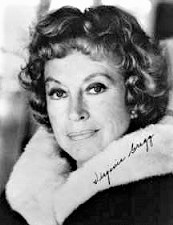 Virginia Gregg (1916-1986) appears in this episode and deserves mention as a recurring and much appreciated member of the cast. She had roles in dozens of Yours Truly, Johnny Dollar episodes and enjoyed a long career in radio, television, and films. She appeared on such radio programs as The Adventures of Sam Spade, Dragnet, Dr. Kildare, Gunsmoke, The Jack Benny Program, One Man’s Family, The Zero Hour and Mutual Radio Theater. She often did double duty with roles in both the radio and television versions of programs. Gregg once said of her work as a character actress on television: “I work steadily, but I have no identity.” She added, “When casting people have a call for a woman who looks like the wrath of God, I’m notified.” On TV, Gregg appeared in programs such as Hawaiian Eye, 77 Sunset Strip, Gunsmoke, Bonanza, Perry Mason, The Rockford Files, Maverick, My Favorite Martian, and The Twilight Zone. Her forty five film roles included the voice of Mrs. Bates in Psycho, Psycho II, and Psycho III. Oh, yeah, and she also played double bass for the Pasadena Symphony. Virginia Gregg died of lung cancer on September 15, 1986.
Virginia Gregg (1916-1986) appears in this episode and deserves mention as a recurring and much appreciated member of the cast. She had roles in dozens of Yours Truly, Johnny Dollar episodes and enjoyed a long career in radio, television, and films. She appeared on such radio programs as The Adventures of Sam Spade, Dragnet, Dr. Kildare, Gunsmoke, The Jack Benny Program, One Man’s Family, The Zero Hour and Mutual Radio Theater. She often did double duty with roles in both the radio and television versions of programs. Gregg once said of her work as a character actress on television: “I work steadily, but I have no identity.” She added, “When casting people have a call for a woman who looks like the wrath of God, I’m notified.” On TV, Gregg appeared in programs such as Hawaiian Eye, 77 Sunset Strip, Gunsmoke, Bonanza, Perry Mason, The Rockford Files, Maverick, My Favorite Martian, and The Twilight Zone. Her forty five film roles included the voice of Mrs. Bates in Psycho, Psycho II, and Psycho III. Oh, yeah, and she also played double bass for the Pasadena Symphony. Virginia Gregg died of lung cancer on September 15, 1986.
This episode opens like many another when Johnny receives a call from the home office in Hartford, CT asking him to check out a recently received request from a young woman who wants to take out a $200,000 life insurance policy on her husband, but naming herself as the beneficiary. This sounds fishy to the home office so Johnny is sent to Los Angeles to verify that all is kosher, for if it is, then $200,000 in the insurance company’s coffers would sit well for all involved. Upon arriving in L.A., Johnny goes to the home of the young woman wanting to take out the insurance policy. She is blonde, blue eyed, built, and is independently wealthy. At age 25 she lives with and supports her playboy 30-year old husband. After talking with the young woman, asking her pertinent questions pertaining to her reason for the high dollar policy, she abruptly quits the interview in mid-stream, disturbed when Johnny asks her why she would want herself as the beneficiary when she is already independently wealthy, the family fortune left to her upon the death of her parents several years before. So Johnny is left with a puzzle to solve with nary a clue to set him toward an answer that would approve or deny the young woman’s request for this special insurance policy. Johnny, of course, after some sleuthing and a bit of luck, does find the answer to his question, but not without becoming aware of an ages-old element of human nature very much with us today. Alas, some things never seem to change, which is why they pay Johnny the big bucks to put his experience and knowledge of the human condition to good use as a top flight insurance investigator.
(The linked 10 disc CD at top left includes this episode and 13 other half hour episodes, along with 4 15-minute, 5-part serials for at total of 34 separate episodes, all remastered and restored.)
Play Time: 29:29
{Airing on a late Sunday afternoon in early September of 1957, the neighborhood gang was still glued to their radios while some of their parents were glued to their favorite grownup shows on the family’s big new TVs. With summer vacation over and another school year about to begin, the gang could hardly wait to hit the nearby newsstand the next day after school. Astounding SF (1930-present, now Analog) was always a must buy, and with the issue below sporting a new Robert Heinlein novel in the offing it was as good as sold. ASF was a monthly in 1957. The Magazine of Fantasy & Science Fiction (1949-present, but with a hiatus after the summer 2024 issue) was now firmly established as a popular newcomer and had become another always awaited SF digest magazine and an obvious purchase. It, too, was a monthly in 1957. Galaxy SF (1950-1980) shook things up with its fresh approach to which themes and topics—political, social, and economic—SF authors could examine, and in short order it was the place to be, both for writers and readers. It was a monthly in 1957, and it and F&SF were giving Astounding a run for its money.}
[Left: Astounding Science Fiction, 9/57 – Center: F&SF, 9/57 – Galaxy Science Fiction, 9/57]
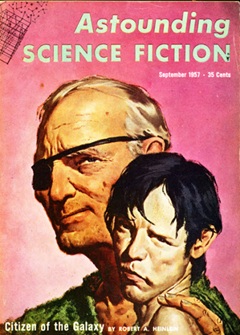
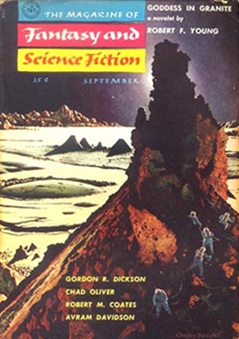
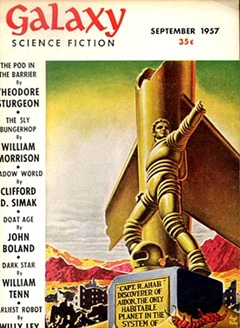
To view the entire list of weekly Old Time Radio episodes at Tangent Online, click here.